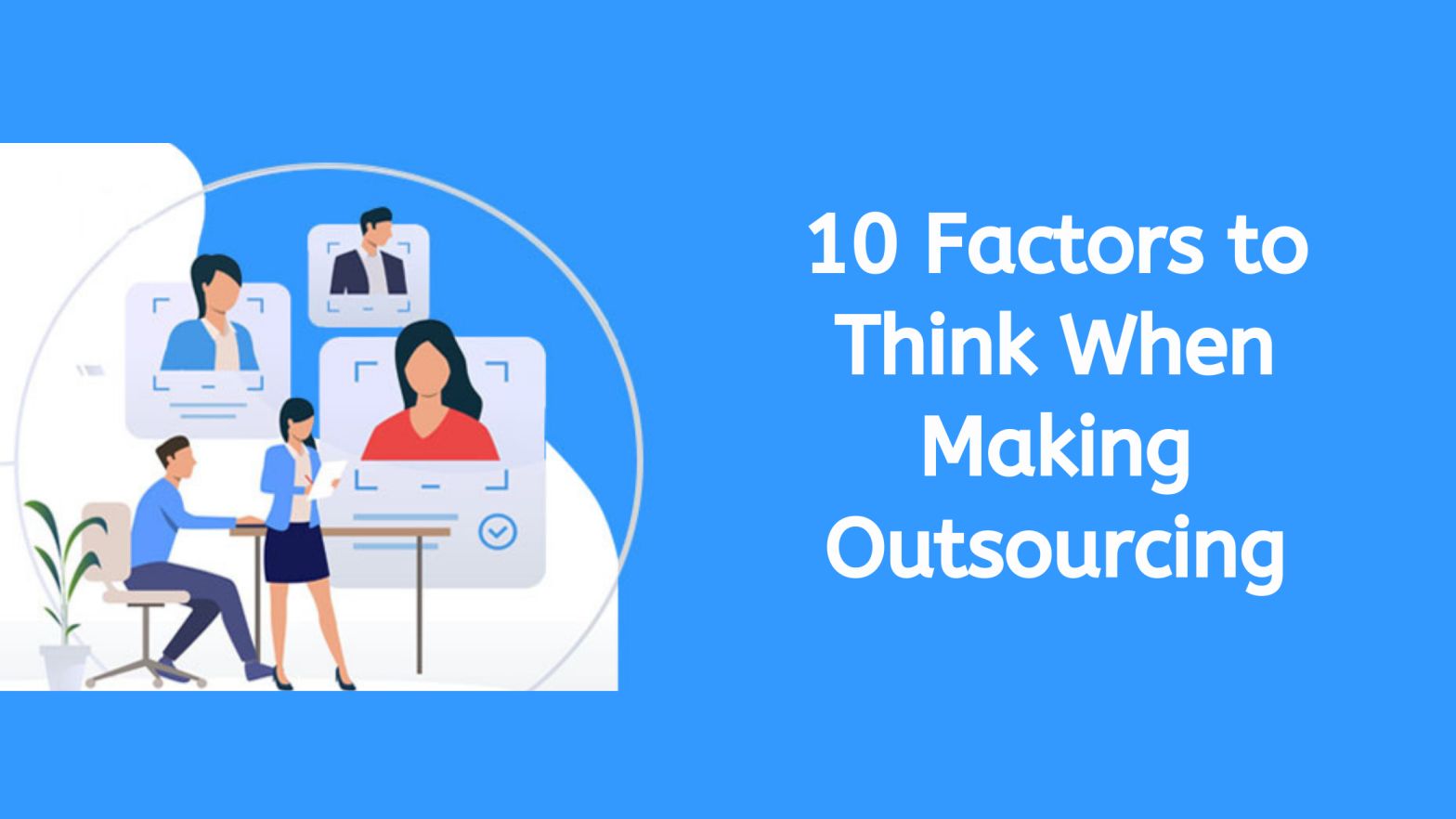My virtual people Blog
10 Factors to Think When Making Outsourcing

Outsourcing business functions are used by both large and small businesses. They can either outsource the majority of their functions or only a few of them to focus on their core business. In both circumstances, experimenters must evaluate several important elements that will ultimately assist them in making an informed decision. Let's look at some of the things to think about while making outsourcing decisions for your company.
1) Cost Savings
When it comes to pure business terms, outsourcing should help your company's bottom line by lowering operational costs. If you don't see this happening anytime soon, you'll probably wind up spending more than you save.

To figure out where you're going, you don't need to be an experienced analyst. All you have to do now is determine whether outsourcing will enable you to save a considerable amount of money on staff and equipment hire. At the same time, you'll need to strike a balance between the quality and quantity of the outsourced employees ' services. If you outsource accounting, for example, you should consider whether performing this activity in-house consumes more resources and costs than outsourcing it.
2) Costing
We've already mentioned how one of the most prevalent reasons for corporations outsourcing is to save money by hiring personnel at a low cost. You'll find many suppliers offering their services at a reasonable price. Instead of going with the cheapest vendor, compare and find out what you'll get from other merchants as well. Some companies, for example, will provide free customer support, which is a terrific deal in and of itself. Remember that, while pricing is essential, it should not be the only element you consider when choosing a seller.
3) Technology and Resources
When it comes to outsourcing, two factors must be considered: technology and resources. Inquire about the tools and technology the vendor plans to employ for your project, as well as their ability to handle all of your outsourcing requirements.

So, what about the finances? Are they well-prepared for the tasks? Is the vendor's office equipped with the most up-to-date systems and capable of handling the most demanding outsourced tasks?
Answers to questions like these can point you in the right direction for finding the right vendor with the best resources and up-to-date technology to handle your company tasks seamlessly.
4) Deadline-Meeting Capacity
The importance of timeliness in outsourcing is equal to the importance of cost. For example, if a vendor misses a deadline, it might cause substantial bottlenecks. That alone will negate whatever cost-cutting gains you had hoped for when you hired them.

You must verify that the vendor delivers on its promises of quality and punctuality. One approach to achieve this is to prepare all of your questions ahead of time. If you discover that the vendor has few quality control procedures in place or that they do not have a backup plan in place if they miss a deadline, it is best not to contact them in the first place.
5) Minimal Oversight
When you choose an outsourcing vendor to handle your business needs, you can rest assured that they will handle everything from the ground up. They should be able to achieve the results and there should be no place for sloppy or bad work. Selecting a competent vendor to handle the projects is essential so that you only have to watch them a little and let them handle the rest. This will allow you to devote more time to your essential business functions.
6) Keep Liabilities to a Minimum
There are specific functional areas that, more often than not, might accumulate liabilities for a company. This consumes time and money that could be better spent elsewhere. Certain functions can be cleverly outsourced to lessen liability to some extent.
7) Dependability
Make a point of visiting the vendor's website before signing on the dotted line. Aside from that, do some internet research to learn more about the company, its infrastructure, safety procedures, and the people who work there. This can aid you in selecting the service providers' trustworthiness. You can also inquire about a vendor if you have a reference who has previously dealt with them. This brings us to the next step.
8) Who Will Be The Team's Leader?
Even though you're saving a lot of money by hiring an outsourcing company, you can't just put your trust in them. Learn everything you can about the team members who will be working on the projects and who will lead them.

Knowing these things ahead of time will save you a lot of grief later on. Furthermore, you will be at ease knowing that your company tasks are in capable hands.
9) Service Level Agreement (SLA)
When it comes to outsourcing relationships, the Service Level Agreement is one of the most important papers. Make it a point to double-check that every detail is written clearly when drafting the document. This will help you avoid any kind of misunderstanding or ambiguity, particularly when it comes to the quality of the services you'll be receiving. It's also a good idea to employ a lawyer specifically to handle your outsourcing project so you don't get into any legal difficulties.
10) Interaction
Whether you're working onshore or with an offshore team, communication is essential. Vendors should be able to manage your inquiries and respond quickly without making you wait an inordinate amount of time. Their communication abilities must be flawless, leaving no room for cultural or other communication hurdles. This ensures that they have fully grasped your expectations and are prepared to deal with any issues that may arise.


No comments yet